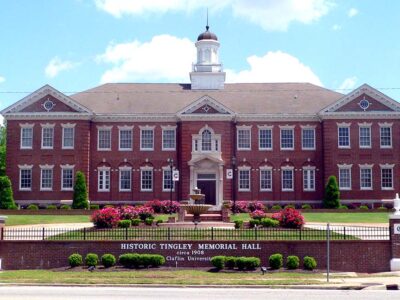“With God, all things are possible,” Ohio’s state motto tells us.
When perusing Ohio faith-based colleges’ admirable array of academic programs and campus-wide initiatives focused on God’s Creation, we encounter noteworthy demonstrations of that slogan. Nearly all of the 42 Buckeye State institutions associated with Christianity have instituted policies on recycling, creating accessible electric vehicle and bike charging stations, and composting uneaten food scraps from dining halls. In addition, many schools are planting organic community gardens to grow produce used not only in preparing student meals, but also in partnerships with local food banks. If these eco-friendly measures already sound impressive, keep reading!
Innovative Programs
With roughly half of Ohio’s faith-based institutions of higher education offering majors and/or minors in Environmental Science and a fourth offering some form of Sustainability Studies, it is clear Christian students are seeking ways to nourish our physical world and its creatures.
Animal lovers may choose to pursue a major in Animal Science at Ohio Wesleyan University, the University of Findlay or Wilmington College. They can also find something similar like Animal Studies at Muskingum University. Horse aficionados can deepen their knowledge in fields ranging from Equine Studies to Equine Business Management at Otterbein University, Wilmington, and Findlay as well. Those thinking of working at a zoo might major in Zoo and Conservation Science at Otterbein or Zoo and Wildlife Biology at Malone University. And those wishing to take the plunge into learning about our waters can earn degrees in Marine Science at Wittenberg University or in Marine Biology at Malone.
Students with an interest in plants can study Botany at Ohio Wesleyan or earn a Bachelor of Science in Agriculture with a concentration in Plant, Environmental, and Soil Science at Wilmington. There, they can also select from a number of other options in agricultural studies, as they can at Cedarville University. At Xavier University, students have the opportunity to enroll in the one-of-a-kind Land, Farming and Community major.
Other leading-edge paths of study in Ohio include Ohio Northern University’s concentrations in Advanced Energy and Environmental Engineering, the University of Dayton’s programs in Renewable and Clean Energy, Heidelberg University’s tack-on specialization in Watershed Science, and degrees in Conservation and/or Restoration at Otterbein, Muskingum, Cedarville, the College of Wooster, and Defiance College. And if your passion is food, you can specialize in Food Policy and Agriculture Advocacy at Wilmington, pursue a major in Sustainable Food Systems at Wooster, or study complex agroecosystems, earning the Ohio Ecological Food and Farm Association certificate from Kenyon College.
Students Collaborate to Preserve the Earth
Christian students love their planet, as shown through the immense interest in Outdoor Adventure clubs among Ohio faith-based colleges. Students at six institutions, Ohio Northern, Cedarville, Findlay, Dayton, Xavier, and John Carroll University, have founded clubs to foster dogs, some of which are trained to serve as service animals in local communities. Findlay and Kenyon students formed groups devoted to saving the world’s imperiled bees, and Ohio Dominican University students have a birding group, giving students the opportunity to learn about birds on and off campus.
Baldwin Wallace College and Heidelberg learners lead community-based greenhouse and gardening projects. Student engineers of faith at Cedarville created an organization that engages with missionaries abroad to build solar-powered LED lights for pastors in Liberia. Students at Mount Vernon Nazarene University, Mount St. Joseph University, Lourdes University, Malone, and Baldwin Wallace joined forces with Enactus—an international experiential learning platform dedicated to developing the next generation of entrepreneurial leaders in creating a more sustainable world—as a means of bringing their eco-friendly concerns to global environmental projects. Meanwhile at the College of Wooster, students lead the Environmental Justice Coalition, which seeks to investigate and educate on the intersection of environmental and social issues.
Campus-Wide Eco-Friendly Initiatives
Ohio faith-based schools exhibit strong commitment to stewardship in their campus practices: a vast majority publicize statements on their sustainability committees’ ways to reach higher goals in encouraging creation care on their campuses. For example, Ohio Northern, Cedarville, and Baldwin Wallace have installed wind turbines, and Ohio Northern, Otterbein, and Baldwin Wallace use solar panels as alternative energy sources. John Carroll, Xavier, and Ohio Wesleyan have implemented programs to help eliminate the carbon footprint created when students move out of dorms by providing pods to collect unwanted items to donate to local organizations.
As a result of suggestions from campus groups focused on sustainability, most schools have some sort of program to promote sustainable practices in their dining halls. Four colleges—Findlay, Ohio Northern, Wilmington, and Bluffton University—contract with Sodexo, a multinational quality of life company devoted to implementing sustainability solutions, specifically in institutional dining. Six Christian colleges in the state—Wittenberg, Wilmington, Baldwin Wallace, Dayton, Xavier, and Kenyon—have buildings on their campuses that meet criteria to earn the LEED (Leadership in Energy and Environmental Design) certification, the worldwide standard for eco-friendly building. Wooster boasts a fitness center run largely by solar energy from its 20,000 square-foot roof. Baldwin Wallace and Ohio Wesleyan in particular shine at the forefront of sustainability with residence units whose inhabitants fully tend to the upkeep of their living quarters, exemplifying the spirit of collaboration that promotes stewardship and clean living on their campuses and throughout the wider communities in their vicinity.
While most of the schools foster experiential learning with students in ecology-related programs assisting in maintaining nature preserves under university dominion, Heidelberg, Muskingum, Wittenberg, and Capital University specifically address water, be it water quality or water capacity management.
Where Faith Meets Creation Care
When it comes to outright linking eco-friendly initiatives on campus and faith, five Ohio Christian schools indicate the relatedness of the two, with Catholic institutions taking the grand prize in the Creation Care category. While both Xavier and Dayton discuss sustainability and Catholicism in the same paragraphs of their sustainability literature, Ohio Dominican and Lourdes go further in rooting their efforts to promote earth-friendly practices in Catholic ideals. The former calls its community to endeavor to minimize negative environmental impacts, making reference to Pope Francis’ statement that “there is nobility in the duty to care for creation through little daily actions,” while the latter dedicates an entire subsection of its institutional statement on valuing the environment to St. Francis’ vision. This vision praises God through His vast creation, recognizing that humans, in their interconnectedness with nature, bear a spiritual responsibility for preserving the planet for future generations.





 Copyright
2024
Root and Vine
Copyright
2024
Root and Vine